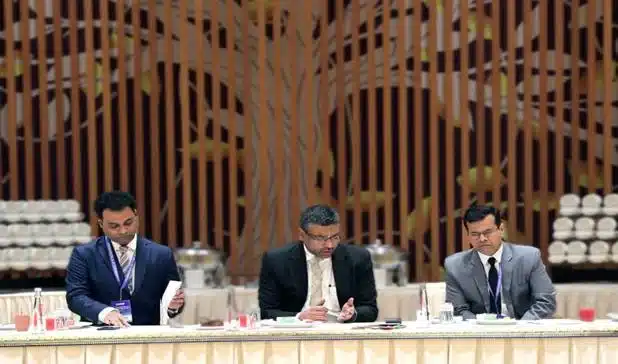
Indian Ministry of Electronics and Information Technology (MeitY) organized a conference at Bharat Mandapam, New Delhi, to accelerate digital transformation across India and strengthen cybersecurity measures. Chaired by MeitY Secretary S. Krishnan, the event brought together IT Secretaries and senior officials from 34 Indian States and Union Territories (UTs), alongside high-level representatives from MeitY, to deliberate on the future of digital governance in India.
This collaborative effort aimed to address key challenges in bridging the digital divide, particularly in India’s North Eastern and hilly states, while fostering innovation and strengthening cybersecurity practices across the country.
Focus on Digital Growth and Empowerment
The conference began with a focused breakfast meeting between the Secretary, MeitY, and representatives from North Eastern and hilly states, including Arunachal Pradesh, Himachal Pradesh, Jammu & Kashmir, Ladakh, and others. Discussions centered around the development of digital infrastructure, extending Bharat Net to the block level, and adopting e-office solutions to streamline governance.
Participants emphasized capacity building, entrepreneurship promotion, and infrastructure development as critical areas for empowering these regions.
Strengthening Cybersecurity and Adhering to the DPDP Act
A significant portion of the conference was dedicated to cybersecurity and data protection, with deliberations on adhering to the Digital Personal Data Protection (DPDP) Act of 2023. MeitY highlighted the need for states and UTs to implement strong cybersecurity measures, including mandatory audits of software and hardware, to safeguard sensitive data and ensure operational resilience.
The discussions highlighted the importance of adopting standardized, machine-readable data formats for seamless and secure data exchange between government departments and stakeholders. States such as Telangana, Uttar Pradesh, and Karnataka presented innovative approaches to developing structured platforms for data exchange while maintaining strict cybersecurity protocols.
Leveraging Emerging Technologies
Emerging technologies took center stage during the discussions, with a particular focus on Artificial Intelligence (AI), Machine Learning (ML), Internet of Things (IoT), drones, and blockchain. These technologies were recognized as transformative tools for modernizing governance, enhancing public service delivery, and improving the quality of life for citizens.
Participants explored innovative applications in healthcare, education, agriculture, and environmental sustainability. The consensus was clear: emerging technologies must be designed to cater to diverse needs and abilities, ensuring accessibility and inclusivity.
States such as Andhra Pradesh, Gujarat, and Delhi highlighted their efforts to integrate these technologies into governance frameworks, emphasizing the need for collaboration and knowledge sharing to bring all states and districts onto a common digital infrastructure.
Recent MeitY Initiatives
The conference also featured presentations on MeitY’s recent initiatives, including:
- Aadhaar Expansion: Partnering with states to strengthen Aadhaar authentication and enrollment systems.
- IndiaAI Mission: Driving responsible, inclusive growth of the AI ecosystem.
- India Semiconductor Mission: Fostering the development of India’s semiconductor ecosystem.
- Integrated Cybersecurity Management: Assisting states in implementing comprehensive cybersecurity measures.
These initiatives demonstrate MeitY’s commitment to advancing digital transformation while prioritizing data security and citizen-centric governance.
Thematic Breakout Sessions
The conference hosted parallel breakout sessions under three key pillars:
- Data Standardisation and Data Exchange Platforms
Discussions focused on creating secure platforms for seamless data exchange. States were urged to adhere to the DPDP Act and prioritize data protection to enhance citizen services and operational efficiency. - Strengthening State Digitalisation Efforts
This session emphasized benchmarking state-level digitalization against best practices, creating family registries, and facilitating two-way data exchange between union and state governments. Regular security audits and anonymization mechanisms were recommended to safeguard data integrity. - Adoption of Emerging Technologies in Public Service Delivery
Participants deliberated on integrating AI, ML, IoT, drones, and blockchain into governance frameworks. The aim was to enhance citizen-government interactions, streamline operations, and ensure 24/7 access to government services.
Building a Unified Digital Framework
The conference concluded with a shared vision of creating a unified digital framework that seamlessly integrates with national digital infrastructure. States and UTs committed to fostering collaboration, adopting best practices, and leveraging emerging technologies to modernize governance and improve public service delivery.
As India moves towards a digitally empowered governance model, the outcomes of this conference are expected to shape the nation’s digital future, ensuring that technology serves as a bridge to connect, empower, and protect its citizens.
In the words of Secretary S. Krishnan, “Digital transformation is not just about technology; it is about people, collaboration, and building trust. Together, we can create a future where governance is accessible, efficient, and secure for every citizen.”
Source: Read More

